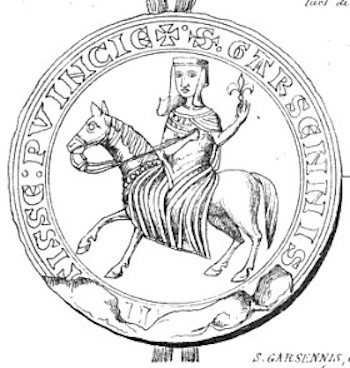Garsenda (c. 1180-1242) was a powerful countess of thirteenth-century Provence and Fourcalquier (now part of southern France). She was also a lover of art and music, a poet, and a generous patron of the artists in her court.
Garsenda was born into a noble family in the Alpine region in the south of France. She was the heir to her grandfather’s county, Fourcalquier. When she was in her early teens, her grandfather, William IV, made a treaty with Alfonso II, a young nobleman in line to inherit the county of Provence: he would marry Garsenda, bringing together the two territories. Garsenda and Alfonso married in the spring of 1193, when she was sixteen years old, and soon had two children, a son named Raymond and a daughter named Garsenda, after her mother and grandmother.
When Alfonso died in 1209, Raymond was only eleven, and Garsenda and her court had to fight her husband’s family to keep control of her territory. She managed to win the power struggle and ruled Provence and Fourcalquier as a regent until Raymond was old enough to take over.
Garsenda was also known as a skilled writer of lyric poetry, or trobairitz. The Occitan region had a strong tradition of female songwriting, as noblewomen were expected to be literate and well-educated in music and poetry. Garsenda would have learned how to play and write music as a young girl. As a ruler, her court was full of music and laughter. She became well known for supporting troubadours who performed for her, many were even said to be in love with her. We have one song written by Garsenda, “Vos que m semblatz d’els corals amadors” (You’re so well-suited as a lover,) in which a lady flirts with a troubadour, encouraging him to make the first move.
In later life, she handed over the reins to her son, Raymond, and retired to live in a monastery. However, she wasn’t done with politics yet. In 1242, at the age of 62, she came to the aid of King Henry III in a war against France by bringing him 60 knights. Garsenda’s four granddaughters took after their formidable grandmother: they grew up to be powerful, educated women who married the kings of France, England, Sicily, and Germany.

